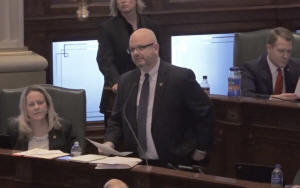|
One
new Illinois law will allow pharmacists and other health care
professionals to distribute fentanyl testing strips in an effort
to reduce opioid overdoses.
State Rep. Jeff Keicher, R-Sycamore, said the strips could
potentially be a life saver.
“We look at fentanyl and the damage it is doing not only to our
state but our nation, and the expediency with which we need to
make sure the tools are available so we can solve the problem on
the front end before we have deaths on the back end,” said
Keicher earlier this year.
Another law requires schools to keep opioid overdose reversal
agents on campus, and another requires fentanyl education in
schools.
“Educating people of all ages on the dangers of potential
overdose is an effective way to help save lives and combat
overdoses long term,” said the bill’s sponsor, state Sen. Laura
Ellman, D-Naperville.
The organization Families Against Fentanyl analyzed data from
the U.S. Centers for Disease Control and Prevention and found
that Illinois is ranked sixth in the country for the most
fentanyl deaths from April 2022 through April of this year.
Families Against Fentanyl spokesperson Moira Muntz said nearly
3,000 Illinois families lost loved ones to fentanyl poisonings.
"Just devastated and heartbroken by the loss of their loved ones
and it's happening far too often to far too many families so our
goal is to raise awareness and to put pressure on lawmakers in
Washington to take further action,” Muntz told The Center
Square.
A measure that requires for-profit music venues that have an
occupancy of 1,000 or more to have opioid overdose antidotes and
trained staff on hand goes into effect in June 2024.
Winnebago County had the highest rates of opioid and other drug
overdose deaths in Illinois last year. According to data
analyzed by the San Francisco Chronicle, the drug overdose death
rate was 53.2 per 100,000 people in Winnebago County in 2022.
Vermillion (52.5), Kankakee (44.3), Cook (43.8) and Peoria
(43.2) counties round out the top five.
State Rep. Tony McCombie, R-Savanna, said that is why
policymakers needed to take action.
“As lawmakers, it is our job to keep the public safe and to take
action when communities are calling for our help,” said McCombie.

|
|




